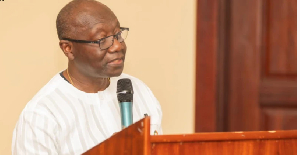The Chief Policy Analyst at the Ghana Institute of Public Policy Options (GIPPO), Dr Charles Wereko-Brobby, has charged President Nana Akufo-Addo to intervene and "immediately halt" the collection of mandatory towing fees expected to take off soon.
The implementation of the newly introduced national towing project by the Road Safety Management Service Limited (RSMSL) will help reduce road accidents in Ghana, DSP Alexander Obeng, Director in charge of Education, Research and Monitoring at the Motor Traffic and Transport Division (MTTD), had earlier explained.
According to him, the MTTD does not have the wherewithal to remove all damaged vehicles from the roads across the country, hence the involvement of the private sector would be apt.
The project, which is a scheme developed by the RSMSL and its partners to remove broken-down or abandoned vehicles on the road, will be implemented from July 1.
As part of the programme, the National Road Safety Commission (NRSC), the Driver and Vehicle Licensing Authority (DVLA), and the Ghana Police Service will team up and work to ensure that broken-down vehicles are towed within an hour or two, depending on the location.
Fees per year for both commercial and non-commercial vehicles, depending on tonnage, range from ?20 to ?200.
However, Dr Wereko-Brobby believes the move is not right and vehicle owners must be made to pay for towing of their own cars.
He told Joy FM on Thursday, June 15 that “a sinner must pay for their sins” and another person must not be made to bear the cost.
Meanwhile, the Chamber of Petroleum Consumers (COPECGH) has urged the NRSC to suspend the proposed towing charges.
“These charges for an initial concept might seem ignoble and paltry but will sure become a further burden on the operations and cost of commercial transport owners who will invariably pass same unto the commuting public to pay in the not too-distant future,” the Executive Secretary of COPECGH, Duncan Amoah, indicated in a press release.
COPECGH believes “in effect, though it’s applicable on paper to only vehicle owners, the entire population who depend on public and commercial transport systems for their daily activities will end up paying for same”.
Business News of Thursday, 15 June 2017
Source: classfmonline.com













